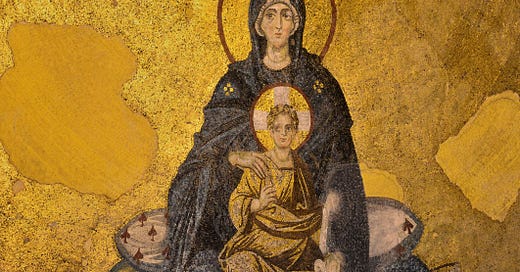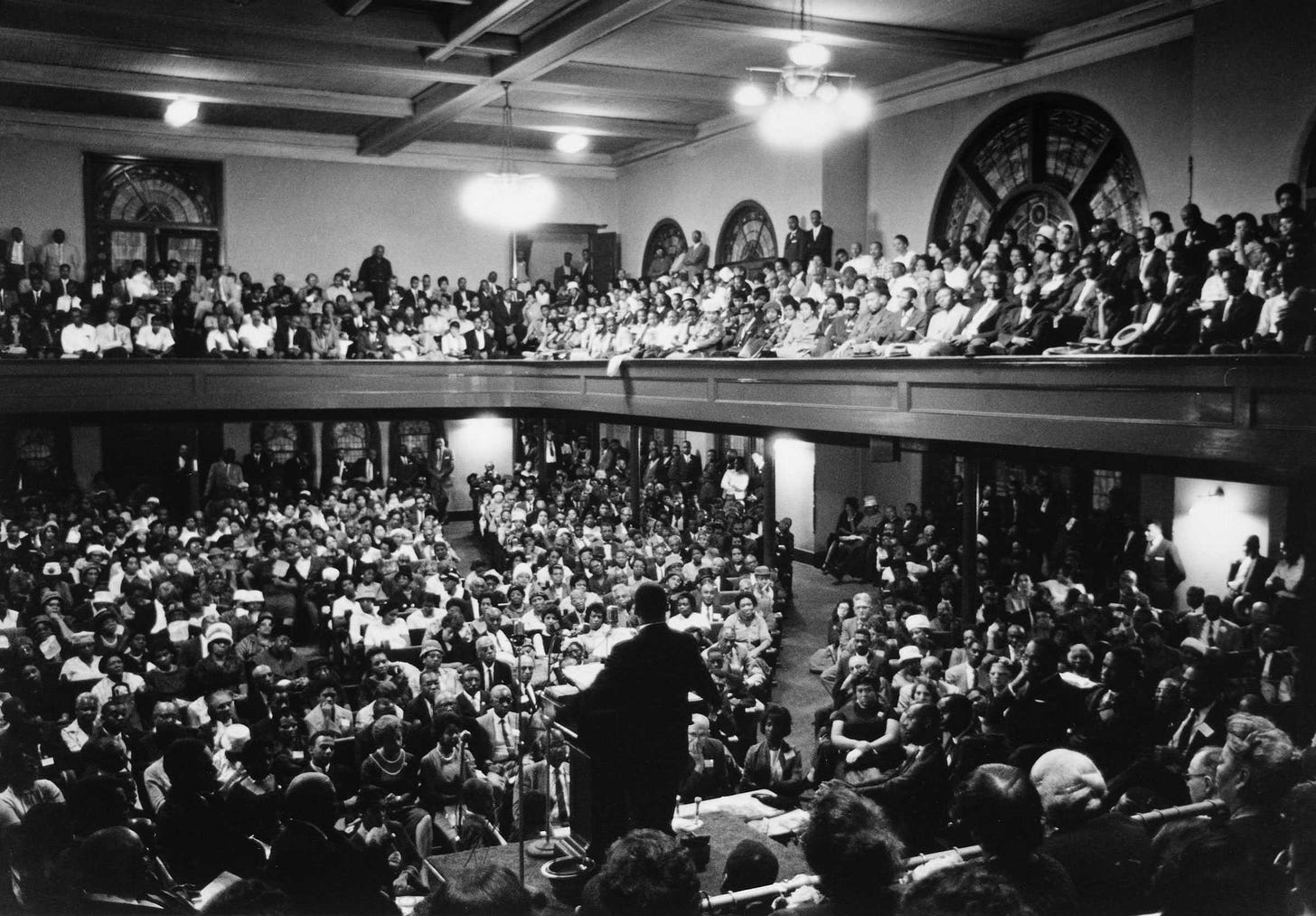"Woman, behold your son. Son, behold your mother." (John 19:26-27)
In the shadow of the cross, as life ebbs from his broken body, Jesus looks down. Through eyes nearly swollen shut, he sees two figures huddled together—his mother Mary and the disciple John, described in the Gospel as "the one whom Jesus loved." In this moment of excruciating pain, Jesus's concern turns not to himself, but to those he leaves behind.
"Woman, behold your son," he says to Mary. "Son, behold your mother," he says to John.
These words—the third utterance from the cross—are deceptively simple. Yet within them lies a revolutionary vision of human connection that speaks powerfully to our fractured world.
Let's examine the text closely. When Jesus addresses Mary as "woman,” he isn't being disrespectful. This is the same term he used when addressing her at the wedding in Cana (John 2:4) and was a respectful form of address.
The word translated as "behold" is an imperative—a command to see, but not merely with physical eyes. It's a call to recognize, to acknowledge, to accept a new reality. What Jesus is establishing here isn't just a practical arrangement for Mary's care; he's creating a new kind of family bond—one that transcends blood relation and is founded instead on shared devotion to him.
John tells us that "from that hour, the disciple took her into his own home" (John 19:27).
In his dying moments, Jesus isn't merely making arrangements for his mother's welfare. He's demonstrating the new kind of community his death and resurrection will create—a family bound not by biology but by shared faith, where former strangers become mother and son.
Now, let's fast-forward to our reality in 2025. We find ourselves in what can only be called an epidemic of isolation.
The statistics are staggering. Despite our hyperconnected world, 61% of Americans report feeling lonely on a regular basis—a figure that has doubled in just the last decade. The average person has fewer close friends than at any point in recorded history. One in four adults can't name a single person they would turn to in a personal crisis.
We have never had more ways to connect and never felt more alone.
This isolation manifests itself in countless ways. Mental health emergencies have reached unprecedented levels, with depression and anxiety now the leading cause of disability worldwide. Public health officials have declared loneliness a greater threat to health than obesity or smoking. The artificial intelligence companions market—digital substitutes for human connection—has become a multi-billion-dollar industry.
But perhaps most alarmingly, we've begun to accept this isolation as normal—even desirable. We've elevated independence to the status of a virtue. "I don't need anyone" has become a statement of pride rather than a cry of desolation.
Look at our housing developments—each home a private kingdom, walled off from neighbors. Look at our political discourse—each side viewing the other not as fellow citizens but as existential threats. Look at our social media feeds—carefully curated facades that create the illusion of connection while keeping authentic relationship at bay.
Even our families—the most fundamental unit of human connection—are disintegrating under the pressure. The nuclear family, once the cornerstone of society, increasingly resembles a temporary arrangement rather than a permanent commitment. Extended families are scattered across continents, connected by occasional video calls but separated by vast physical and emotional distance.
And the church—the very community Jesus established with his words from the cross—has not been immune. We've turned the body of Christ into a consumer experience, a place to receive religious goods and services rather than to form the deep bonds of spiritual family.
We are dying of disconnection while pretending we're just fine on our own.
Into this epidemic of isolation, Jesus speaks his third word from the cross: "Behold your son. Behold your mother."
This command to "behold" is more radical than we might first realize. Jesus isn't merely asking Mary and John to look at each other. He's commanding them to see each other in a new way—to recognize a bond that transcends their existing relationship categories.
Think about what this meant for them. Mary, in her deepest grief, is told to see in John not just her son's friend but her own son. John, in his confusion and fear, is told to see in Mary not just his teacher's mother but his own mother. Each is called to embrace the other not as an optional connection but as essential family.
And this is precisely what Jesus is calling us to in 2025: a radical re-envisioning of our human connections. Not as optional add-ons to our individual journeys, not as transactional arrangements for mutual benefit, but as sacred bonds essential to our very identity.
The Christian vision has never been the rugged individual standing alone before God. It has always been persons-in-community, reflecting the very nature of our triune God.
When we say God is love, we're saying God is relationship—Father, Son, and Spirit in eternal, perfect communion. When we're told we're made in God's image, it's not just our capacity for reason or creativity that reflects God, but our capacity for deep, self-giving relationship.
This is why Jesus didn't merely save individuals; he created a church. Not an institution or a building, but a family—brothers and sisters, mothers and fathers, bound together not by blood but by the deeper bond of his Spirit.
But here's the challenging truth we must confront: this kind of sacred community comes at a cost. Both Mary and John had to embrace discomfort and sacrifice to fulfill Jesus's command.
For Mary, it meant allowing someone new into the sacred space of mother-son relationship. It meant being vulnerable in her grief, accepting care from someone who wasn't her biological family. It meant moving forward when everything in her wanted to stay fixed at the foot of the cross.
For John, it meant taking responsibility for someone else's welfare when he himself was traumatized and afraid. It meant opening his home, adjusting his plans, sharing his resources, and entering into Mary's grief journey—not just for a season but for the rest of her life.
Neither could have predicted this new arrangement. Neither would have chosen it on their own. But in their obedience to Jesus's command to "behold," they found not just obligation but gift—a new relationship that would sustain them through the dark days ahead.
And so it is with us. The kind of sacred community Jesus calls us to isn't comfortable or convenient. It doesn't align neatly with our individual preferences and plans. It involves risk, vulnerability, inconvenience, and sacrifice.
Real community will cost you something. And that's precisely why we avoid it.
We've created a thousand substitutes for authentic community—from digital connections that can be turned off with a swipe to church experiences that require nothing more than occasional attendance. We want the benefits of belonging without the messy entanglements of true intimacy.
But Jesus's command from the cross offers no such comfortable compromise. "Behold your son. Behold your mother." See each other. Commit to each other. Become family to each other—not in sentiment only, but in costly, everyday reality.
So what does it look like to live into Jesus's third word from the cross in 2025?
First, it means recognizing our disconnection as the spiritual crisis it is. Our isolation isn't just a social preference or a cultural trend—it's a profound distortion of our God-given nature. The loneliness epidemic isn't merely unfortunate; it's a symptom of spiritual malformation.
Second, it calls us to intentional vulnerability. The greatest barrier to authentic community isn't lack of opportunity but fear of being truly known. We can't be connected while maintaining our carefully constructed facades. When was the last time you let someone see your unfiltered self—your doubts, your struggles, your unimpressive reality? When was the last time you were honestly answer the question, "How are you?"
Third, it invites us to expand our definition of family. Jesus redefined family along spiritual rather than biological lines: "Whoever does the will of my Father in heaven is my brother and sister and mother" (Matthew 12:50). This doesn't devalue biological family; it expands our capacity for kinship beyond its natural boundaries.
Who are the people Jesus is calling you to "behold" as family? The elderly neighbor living alone? The single parent struggling to balance work and childcare? The immigrant family trying to navigate an unfamiliar culture? The political "opponent" you've been taught to view as enemy rather than fellow image-bearer?
Fourth, it challenges us to create concrete structures of belonging. Spiritual family isn't formed through warm feelings and vague intentions, but through specific commitments and practices. This might look like:
Intentional communities where resources and living spaces are shared
Covenant groups committed to walking through life's joys and sorrows together
Intergenerational relationships where wisdom and energy flow in both directions
Regular practices of hospitality that invite others into our private spaces
Fifth, it requires us to stay when every instinct says to leave. Our consumer culture has trained us to move on whenever relationships become difficult or disappointing. But spiritual family, like biological family, isn't disposable when it fails to meet our expectations. The command to "behold" is ongoing—a continuous choice to see and commit, even when the initial enthusiasm fades.
I want to ask: Who has Jesus positioned in your line of sight, saying to you, "Behold"?
Who are the people standing with you at the foot of your own crosses—the difficult circumstances, painful losses, or challenging transitions you're experiencing? Who has God placed in your life not merely as casual acquaintances but as spiritual family?
And more uncomfortably: Who have you been refusing to "behold"? What relationships have you kept at a safe, superficial level? What potential spiritual family members have you held at arm's length because deep connection seems too risky or inconvenient?
The isolation epidemic won't be solved through government programs or technological innovations. It will only be healed through millions of individual decisions to obey Jesus's command from the cross: "Behold your son. Behold your mother."
In a world starving for authentic connection, these simple acts of obedience to Jesus's third word from the cross can become radical acts of witness. They declare that there is another way to be human—not as isolated individuals pursuing private fulfillment, but as persons-in-community reflecting the very nature of our relational God.
When Jesus said, "By this everyone will know that you are my disciples, if you love one another" (John 13:35), he wasn't describing a nice addition to our evangelistic strategy. He was identifying the primary apologetic for Christianity in a disconnected world.
The most compelling argument for the gospel in 2025 isn't sophisticated philosophy or impressive programs. It's ordinary Christians living in extraordinary community—spiritual brothers and sisters, mothers and sons, who have heard and obeyed Jesus's command from the cross: "Behold your family."
As we stand at the foot of the cross today, may we hear these words afresh. May we have the courage to truly see each other. And in that seeing, may we find not just the family we need, but the family our disconnected world desperately longs to behold.
"Woman, behold your son. Son, behold your mother."










